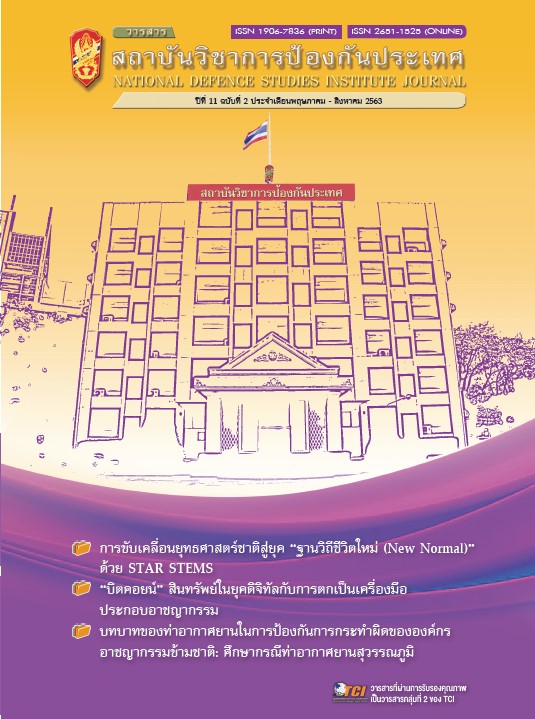An Empirical Study of Digital Innovation Literacy Skills of the Royal Thai Air Force Personnel
Main Article Content
Abstract
The objectives of this quantitative research are to study. 1) Different characteristics of demography on digital literacy skills of the Air Force officers, 2) Influential knowledge that effects on digital technology access and awareness, digital technology tools, creating digital media for collaboration and 3) Influential factors of knowing digital literacy skills and its innovation that would impact on planning and benefits from development of digital literacy skills of the Royal Thai Air Force officials. Sample group used in this research was 400 Air Force Civil Service officers in the central and provincial areas. The instrument used in this research was a questionnaire measuring levels of knowledge on digital technology, ability on knowing digital innovation, and opinions on planning and benefits from development of model-fit on digital innovation skills. The IOC value of 0.96 was obtained with validity of 0.53 and the Cronbach's Alpha coefficient of .971. Descriptive statistics used in the research were frequency, percentage, mean and standard deviation. Statistics used to test research hypotheses including t-test, F-test, and multiple regression analysis.
The research found that knowing digital innovation have affected on planning and benefits from various skills: 1) Digital technology access and awareness concerning usages of the following computer technologies, i.e. Operating System (b=.069), internet (b=.080), and calendar application (b=.060). 2) Skills in using digital technology basic tools for presentation programs (b=.159), word processing programs (b=.112), and spreadsheet programs (b=-.077). 3) Creating digital media for taskforce collaboration concerning usages of multimedia and security programs, i.e. screen capture program (b=.094), defining authentication (b=.067). And 4) Knowledge of digital technology focuses on office software, specifically on spreadsheet programs.
Article Details
The articles, images, tables, graphs, written content, and opinions published in this journal are solely those of the authors and do not necessarily reflect the views or positions of the National Defence Studies Institute or its academic affiliates.
References
กระทรวงดิจิทัลเพื่อเศรษฐกิจและสังคม. (2559). แผนพัฒนาดิจิทัลเพื่อเศรษฐกิจและสังคม. สืบค้นเมื่อ 11 มกราคม 2561,
จาก http://www.mdes.go.th/assets/portals/1/files/590613_4Digital_Economy_Plan-Book.pdf
กองทัพอากาศ. (2559). ยุทธศาสตร์กองทัพอากาศ 20 ปี. สืบค้นเมื่อ 15 มกราคม 2561, จาก http://www.rtaf.mi.th/
th/Documents/Publication/RTAF_Strategy_20y_2560-2579.pdf
แววตา เตชาทวีวรรณ และอัจศรา ประเสริฐสิน. (2559). การประเมินการรู้ดิจิทัลของนักศึกษาระดับปริญญาตรีในเขต
กรุงเทพมหานครและปริมณฑล. วารสารสารสนเทศศาสตร์, 34(4), 1-28.
สถาบันคุณวุฒิวิชาชีพ (องค์การมหาชน), สำนักงานคณะกรรมการข้าราชการพลเรือน (ก.พ.) และสำนักงานรัฐบาลอิเล็กทรอนิกส์
(องค์การมหาชน) (สรอ.). (2561). (ร่าง) มาตรฐานสมรรถนะด้านดิจิทัลสำหรับข้าราชการและบุคลากรภาครัฐ.
กรุงเทพฯ: มหาวิทยาลัยเกษตรศาสตร์.
สำนักงานคณะกรรมการข้าราชการพลเรือน. (2560). แนวทางพัฒนาทักษะด้านดิจิทัลของข้าราชการและบุคลากรภาครัฐ
เพื่อการปรับเปลี่ยนเป็นรัฐบาลดิจิทัล. สืบค้นเมื่อ 11 มกราคม 2561, จาก http://www.ocsc.go.th/sites/
default/files/attachment/page/process_dev_digital.pdf
สำนักงานพัฒนาวิทยาศาสตร์และเทคโนโลยีแห่งชาติ. (2558). การรู้ดิจิทัล (Digital literacy). สืบค้นเมื่อ 2 กุมภาพันธ์
, จาก https://www.nstda.or.th/th/nstda-knowledge/142-knowledges/2632
Alexander J.A.M., van Deursen, & Jan A.G.M. van Dijk. (2011). Internet skills and the digital divide.
New Media & Society, 19(9), 1-19.
Alexander J.A.M., van Deursen, Helsper, E. J., & Eynon R. (2014). Measuring digital skills from digital skills
to tangible outcomes project report.
American Library Association. (2012). Digital literacy, libraries, and public policy. Retrieved February 2,
, from http://www.districtdispatch.org/wp-content/uploads/2013/01/2012_OITP_digilitreport_
_22_13.pdf
Bawden, D. (2008). Origins and concepts of digital literacy. In C. Lankshear, & M. Knobel (Eds.), Digital
literacies: Concepts, policies & practices (p.17-32). New York: Peter Lang.
Cronbach, L. J. (1951). Coefficient alpha and the internal structure of tests. Psychometrika, 16(3),
-334.
Fernández-Cruz, F. J., & Fernández-Díaz, M.J. (2016). Generation Z's teachers and their digital skills.
Cumunicar, 46(25), 97-105.
Garrett, H. E. (1979). Statistics in psychology and education (9th ed.). Bombay: Valks, Feffer and Simons.
Hague, C., & Payton, S. (2010). Digital literacy across the curriculum. Bristol: Futurelab.
Hargittai, E. (2002). Second-Level Digital Divide: Differences in People’s Online Skills. First Monday, 7(4).
Kuder, Frederic G. and M.W. Richardson. (1937). The Theory of the Estimation of Test Reliability.
Psychometrika, 2(September 1937), 151-160.
Leahy, D., & Dolan, D. (2010). Digital literacy: A vital competence for 2010? In N. Reynolds, & M.
Turcsanyi-Szab o (Eds.), Key competencies in the knowledge society (p.210-221). New York,
NY: Springer.
Likert, R. (1932). A technique for the measurement of attitudes. Retrieved February 1, 2018, from
https://legacy.voteview.com/pdf/Likert_1932.pdf
Martin, A., & Grudziecki, J. (2006). DigEuLit: Concepts and Tools for Digital Literacy Development.
ITALICS: Innovations In Teaching & Learning In Information & Computer Sciences.
Newman, B.L. (2012). Defining digital literacy. Retrieved January 26, 2018, from http://www.districtdispatch.
org/2012/04/defining-digital-literacy/defining-digital-literacy
Pérez-Escoda, A., Castro-Zubizarreta, A., & Fandos-Igado, M. (2016). Digital skills in the Z generation:
Key question for a curricular introduction in primary school. Cumunicar, 49(24), 71-79.
Rovinelli, R. J., & Hambleton, R. K. (1977). On the use of content specialists in the assessment of
criterion-referenced test item validity. Dutch Journal of Educational Research, 2, 49-60.
Schumacher, P., & Morahan-Martin, J. (2001). Gender, Internet and computer attitudes and experiences.
Computers in Human Behavior, 17(1), 95–110.
Yamane, T. (1973). Statistics: an introductory analysis. New York: Harper & Row.


